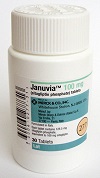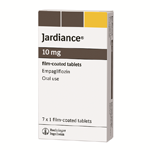 The good news for Merck & Co.'s Januvia and other DPP-4 diabetes fighters: So far, there's no evidence that doctors or patients are jumping ship for SGLT2 meds, a newer class where Eli Lilly & Co. and Boehringer Ingelheim recently posted impressive cardiovascular data.
The good news for Merck & Co.'s Januvia and other DPP-4 diabetes fighters: So far, there's no evidence that doctors or patients are jumping ship for SGLT2 meds, a newer class where Eli Lilly & Co. and Boehringer Ingelheim recently posted impressive cardiovascular data.
That's the word from Merck ($MRK) executives, who cited prescription numbers to that effect on Tuesday's earnings call with analysts.
But the same doesn't apply within SGLT2 borders. Again citing new-to-brand script data, Merck EVP Adam Schechter said, "[W]e see switching that's occurring within the SGLT2 class, but we do not see switching occurring across classes at this point in time."
That's good news, of course, for Lilly ($LLY) and Boehringer, whose SGLT2 drug Jardiance delivered outcomes trial data showing it cut the risk of heart attack, stroke and cardiovascular death--a first for a diabetes drug. In fact, during its own earnings call, Lilly quoted new-to-brand numbers that show Jardiance is gaining momentum in recent weeks.
 Before the companies unveiled top-line data from the EMPA-REG outcomes study, Jardiance's share of new-to-brand scripts in SGLT2 meds was 15%. When those study data were presented at the European Association for the Study of Diabetes meeting last month, that share crept up to 17%.
Before the companies unveiled top-line data from the EMPA-REG outcomes study, Jardiance's share of new-to-brand scripts in SGLT2 meds was 15%. When those study data were presented at the European Association for the Study of Diabetes meeting last month, that share crept up to 17%.
Now, it's at 21%, said Lilly diabetes chief Enrique Conterno, and the signs point to more gains.
"Probably most relevant is the share shift that we've seen post-EASD with endocrinologists, going from 21% to 31% new-to-brand share despite the fact that there's no promotion," Conterno said during the call.
Not good news for Johnson & Johnson ($JNJ), whose Invokana has been the class leader, thanks in part to some intensive investment in advertising and marketing, including direct-to-consumer and medical journal ad placements, and an active doctor-speaker program.
J&J figures that Jardiance's ability to cut cardiovascular risks will extend across the SGLT2 class, and many analysts agree. But Invokana's outcomes study isn't due until 2017, which gives Lilly and Boehringer a "fairly large window" to position Jardiance with payers and prescribers, Bernstein analyst Tim Anderson said in a research note when the EMPA-REG results were unveiled. And that "could lead to an outsized benefit relative to other SGLT2s," he added.
Lilly plans to file the EMPA-REG data with the FDA by year's end, CEO John Lechleiter said last week.
 |
| Eli Lilly's Enrique Conterno |
During Lilly's call, Anderson asked whether the Jardiance data could trigger a price war among SGLT2 drugs, as Invokana looks to regain a marketing edge; Conterno said it's tough to speculate, but the study results "create differentiation in the marketplace," making Lilly "very confident in the value proposition" it offers to payers.
Meanwhile, Merck maintains that Januvia and its combination sister Janumet will keep on chugging. For one thing, its position on payer formularies "remains strong," Schechter pointed out, and the 2016 decisions on exclusives and placement are already made.
"We believe that this market is very big," Schechter said. "It requires multiple medications for people over time, and we believe that Januvia will maintain a very strong add-on position as we go into the future."
For what it's worth, Lilly says it has no plans to change its approach to marketing its own DPP-4, Tradjenta. The drug is "uniquely differentiated in the DPP-4 class," Conterno said, and it's "the fastest grower in that class. So growth is very, very strong."
- check out the Merck transcript at Seeking Alpha
- get more from Eli Lilly's Q3 call
Special Reports: Top 10 drug brands by payments to doctors - Invokana, J&J | Top 10 best-selling diabetes drugs of 2013